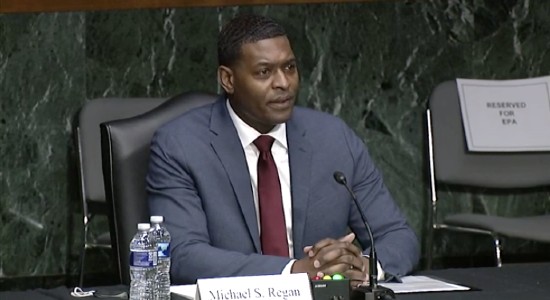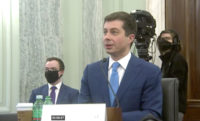Speaking at his Senate confirmation hearing, Michael Regan, President Joe Biden's nominee to lead the US Environmental Protection Agency, sought to alleviate Republican senators’ concerns about the president's climate-related policies linked to tension between protecting jobs and setting in place new environmental regulations and phasing out uses of fossil fuels.
In his appearance before the Environment and Public Works Committee on Feb. 3, Regan suggested that some of those new jobs could come from Biden's plans to increase funding on infrastructure improvements and constructing or modifying infrastructure to better withstand threats from storms and other natural disasters. Regan seemed to have bipartisan support from the committee for his nomination.
“We’re moving beyond the old argument that we have to pit creating jobs against protecting the environment,” Regan told the committee in his opening statement. He was referring to his work in North Carolina, where he has been secretary of the state Department of Environmental Quality since 2017.
The committee, on the cusp of turning over its leadership to the Democrats, was chaired by Sen. Shelley Moore Capito (R-W.Va), likely the shortest committee chairmanship in the Senate’s history, joked Sen. Richard Burr (R-N.C.).
When Regan delved into job creation, GOP committee members brought up Biden’s actions since his inauguration. Those moves include cancelling the Keystone XL pipeline and issuing an executive order halting new oil and gas leases on federal lands, a move that, Sen. John Barrasso (R-Wyo.) contended, “threatens tens of thousands of jobs.”
Regan said, “We’re looking at all jobs,” referring to investments in water infrastructure, the electric grid, transportation, bridges and pipeline repairs as opportunities for “growing as many jobs as possible.”
Sen. Dan Sullivan (R-Alaska) expressed concerns that Biden’s policies “appear to be killing … good jobs during a recession with nothing to replace them,”
Regan countered by speaking of transferring skills from some types of energy jobs to work on infrastructure upgrades and rehabilitation. “I believe that many of the jobs and the skill sets that people have in your state and other states can move quickly to those jobs,” said Regan. “There is a path. There is a vision.”
In a marked change from the EPA position under former President Donald Trump, Regan also addressed the human contribution to climate change and extreme weather events and the job opportunities presented by mitigation and making infrastructure more resilient.
“We’ve got to adjust to the new storm intensity, the new flooding,” Regan said. “We cannot build the same way we’ve always been. We cannot put Humpty Dumpty back together the same way every time.”
Throughout the hearing, Regan stressed themes of “convening stakeholders” and incorporating science and data into decision-making, He also spoke of designing regulations in a way that gives states and localities flexibility in how those rules are applied. For example, he mentioned considerations of carbon-capture technology, the renewable-fuel standard and Clean Air Act regulations governing emissions of pollutants by coal-fired power plants.




Post a comment to this article
Report Abusive Comment